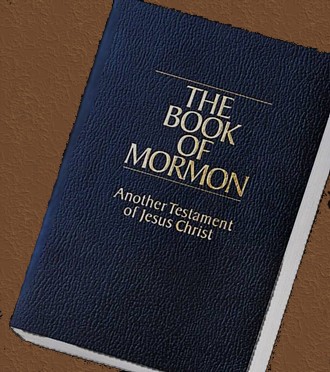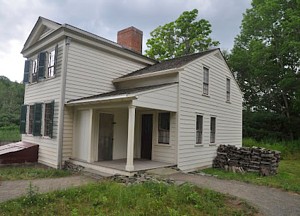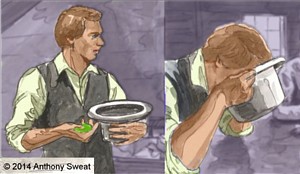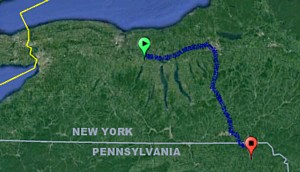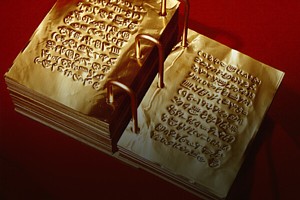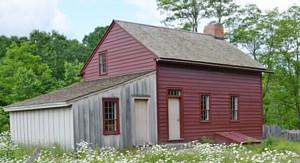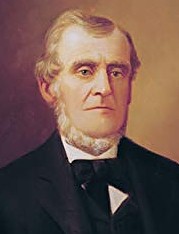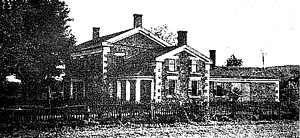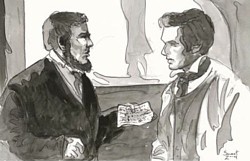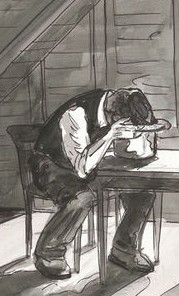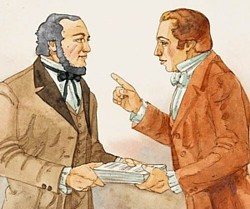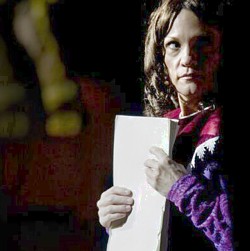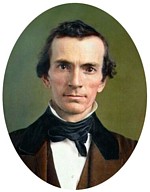The
Book of Elmo
Written
January 15, 2021, and March 16, 2023
As a courtesy to you, dear reader, following this introductory sentence I shall endeavor to express myself in the idioms of language which, it has been given to me to understand, are presently employed during your era, far removed though that era be from mine.
My name is Elmo Hale. I died — or thought I did — at the age of twenty during a smallpox epidemic in the winter of 1832.
You can imagine my surprise when I awakened last week! Perhaps this has been accomplished through the agency of some steam-powered machinery for time travel. At any rate, I have discovered that I am no longer in the 19th century, nor even in the 20th, but in the 21st!
|
|
I
found myself lying, not on my death cot, but in a large bed within a
room of a marvelous inn. This hotel is apparently the property
of one J.W. Marriott whose name appears above the door, although I
have not yet met that gentleman. |
|
|
I knew the author! Or at least I knew the man who first published it to the world. That publication took place two years before I died. The book was produced by my brother-in-law. His name was Joseph Smith. |
|
|
|
Seven years before my death, I was living in this farmhouse on the Susquehanna River in northeastern Pennsylvania with my parents Isaac and Elizabeth Hale and eight other children. One of them was my 21-year-old sister Emma, who had remained unmarried so that she could be a teacher at a local school. |
We called our settlement Harmony. (I'm told it's now called Oakland so as not to be confused with another Harmony farther west in Pennsylvania.) Allegedly, there was a lost Spanish silver mine somewhere in the area.
Meanwhile, in the state of New York near the town of Manchester, the art of crystal gazing was being practiced by Joseph Smith and his son Joseph Junior. I believe the younger Joseph possessed a luminescent crystal which glowed faintly in the dark.
|
|
The glow could only be observed in a dark place such as the interior of a top hat. He would drop the magic rock into a hat, put his face over the hat to block out extraneous light, and let the stone reveal its supernatural knowledge to him. |
The Smith family were reported to experience visions and to dabble in folk magic like soothsaying and divining rods. They often hired themselves out to “descry” things otherwise invisible — perhaps buried treasure, though there was no proof that they had ever found anything.
One of our neighbors in Harmony, Josiah Stowell, dreamed of discovering and claiming the riches of the lost silver mine.
|
|
For that purpose, in 1825 he brought the younger Joseph Smith down from Manchester, a journey of some 150 miles. The two men dowsed and dug for the precious metal but found nothing. |
Smith did not board with Mr. Stowell but rather with us, the Hale family. My Methodist parents found him rather disreputable, coming as he did from the “burned-over district” of New York that had recently been scorched by the fires of religious revivalists and utopians.
Not yet 20 years old, Joseph loved stories about the Indians who dwelt in this land before Europeans arrived. From whence had they come? Some speculated that they were the remnants of the Ten Lost Tribes of Israel. Moreover, they were expected to be restored in a new Jerusalem to be established on this continent, and Christ would be on the throne.
Joseph amused us by describing the Indians' ancient life and religion as easily as if he had lived with them all his life — or as easily as if he were “doing improv,” which I understand is the term for extemporaneous acting.
He courted my naïve sister Emma, who was fascinated by the supernatural as he was. In January of 1827 he married her and took her back to Manchester to live with his family.
He continued to dig for buried treasure there. In September of that year, on a hill three miles from the Smith home, he claimed that the angel Moroni had allowed him to unearth a stone box.
Within it was a book made of shining golden plates! And they were engraved with what appeared to be ancient Egyptian hieroglyphs!
|
No one in Manchester could read them. One reason: the key to deciphering heiroglyphic texts was only then in the process of being worked out in France via Monsieur Champollion's study of the Rosetta Stone. The greater reason: Joseph allowed no one beside himself to see his alleged treasure! |
|
The neighbors grumbled. This seemed to be merely an embellishment of the tall tales that the young man had been telling for the past four years, dreaming of mysterious plates guarded by an angel.
As Christmas approached, Joseph's bride Emma was with child. She was only three months along, but soon she would need the assistance of relatives — in particular, the sainted woman in Harmony who was her mother and mine.
|
|
Therefore Joseph purchased 13 acres of farmland from my father. He and Emma moved back to Pennsylvania and set up housekeeping in this humble building just 500 feet east of our house. |
The Smiths had brought the box of golden plates with them. It was wrapped in a cloth to conceal it from our view, though some of us were permitted to lift the bundle to note how heavy it was.
|
|
Before long, Harmony received another visitor from New York State, one Martin Harris. He was a man of some means who lived in a substantial home near Manchester. |
|
|
Mr. Harris was excitable. Some might call him a religious fanatic. Once when a candle flickered, I saw him leap up and proclaim that the devil had caused it to sputter. On another occasion, I heard him describe meeting a deer who turned out to be Jesus. He and the deer walked together for a couple of miles, conversing all the way. Nevertheless, everyone seemed to believe that Martin was honest about his visionary experiences.
Having heard about Joseph's plates, he had brought $50 with him to finance the translation of the hieroglyphics they contained — if they existed. Like others from Manchester, he had begun to doubt it. And he still wasn't allowed to see the plates.
Young Mr. Smith came up with an idea to give Martin “a reason for the hope that was within him” and to convince him to part with the $50.
|
|
Onto a sheet of paper, Joseph would secretly copy some of the hieroglyphs from the plates, thus producing a strange page of squiggles and symbols. He gave that to his prospective sponsor, urging him to take it home and show it to his wife Lucy, which he did. |
Later that spring, Martin returned to us at Harmony, this time bringing Lucy along. She told us she wished Martin would stop making these silly spiritual treks. Whenever he was away, she was left at home to maintain the farm and raise their four children and care for Martin's elderly parents. It was exhausting. To preserve the family, she wanted him to stay at home where he belonged. However, he had insisted she come with him to Pennsylvania, where he was convinced that Joseph Smith had something valuable.
Lucy had seen the single-page copy, but she wanted to examine the actual plates. However, Joseph said he'd hidden them somewhere in the woods. Nevertheless, he claimed that, even without the plates being physically present, he had the ability to read their text and translate it into English. He would dictate the translations. He asked Martin, ever eager to experience a miracle firsthand, to serve as his scribe.
Grumbling, Lucy went home to Manchester, but Martin agreed to stay in Harmony for two months and work on the translation.
How was this accomplished? One day I went to the Smith house and sneaked upstairs to find out what was going on. Peering from behind the top step, I observed that Joseph had placed a hat on the table with a rock inside it, which I heard him describe as his “seer stone.” He buried his face in the hat — thereby appearing ridiculous, for hats belong upon heads and not upon faces.
|
|
Joseph stared at the hidden stone and dictated what sounded like legitimate Holy Scripture. It sounded like the Old Testament I had read in the King James Bible, or at least a passable imitation thereof.
And it came to pass that behold, [Alma 2:25-28] |
And thus did the thirty and eighth year pass away, and also the thirty and ninth, and forty and first, and the forty and second, yea, even until forty and nine years had passed away, and also the fifty and first, and the fifty and second; yea, and even until fifty and nine years had passed away.
[4 Nephi 1:6]
He named scores of people and places with fanciful names I had never heard before. Supposedly, these were ancient native Americans descended from even more ancient Hebrews. For example, there was a lawyer named Zeezrom who interrogated another man named Amulek. Z asked A, “Is there more than one God? How do you know?”
Joseph spoke rather slowly and deliberately. It must have been challenging for him to produce his translations (or, perhaps, his improvisations). Also, he might have been allowing Martin time to carefully write down the words.
By the middle of June, Martin had transcribed 116 pages of manuscript. But he was thinking of his wife.
According to Lucy's letters, their Manchester neighbors were highly skeptical of the whole affair. Martin was supposedly an upstanding citizen; why wasn't he home taking care of his family and farm, as he should be? Had he gone completely crazy?
Martin again asked Joseph to show him the plates, as a “further witness of their actual existence” so he could convince Lucy to share his enthusiasm. Again Joseph wouldn't allow it.
“Well,” said Martin, “what about the manuscript that I have been transcribing for you? Could I at least take that to Manchester, to demonstrate to my wife how fruitful have been our labors?”
|
Joseph refused twice more. However, at last he relented, saying he had received a word from the Lord. But Martin would be allowed to show the pages only to Lucy and to four other specific relatives. Martin, swearing to abide by those conditions, set out for New York State while Joseph remained with his wife and the rest of us Hales. |
|
|
|
When Martin arrived, we're told, he let Lucy read the manuscript, followed by the four family members. We are not told what they thought of the supposed scripture. Then Martin violated his oath; he began proudly displaying the pages to any neighbor who dropped by! Tired of this foolishness, Lucy locked the manuscript in her bureau. |
Meanwhile, back in Harmony, Joseph's firstborn son came into the world on the 15th of June. I was present at that difficult birth.
Tragically, the baby did not survive, and my sister almost died herself. “This is a terrible sign from the Lord,” Joseph told her, making the misfortunes of his wife and son all about him. “He is telling me that I should never have allowed Martin Harris to take those 116 pages away from me! I have spent these past two months painstakingly translating the beginning of the sacred story of how Jesus came to the New World and preached the Gospel to the Indians. But now all my work is at risk!”
For two weeks Smith tended to Emma until she had somewhat regained her strength. Then he left her in the care of our Hale family and hurried back to Manchester to retrieve the manuscript.
He found Mr. Harris in distress, unable to produce the pages. Lucy had locked them away, Martin explained, so he had broken into her bureau. In so doing, he damaged the lock. Furious, his wife moved the manuscript to another hiding place. She refused to tell him where. It was even possible that she had burned the pages. Joseph urged him to search his house again, but Martin told him he had already ripped open beds and pillows.
One would think that Joseph, being a prophet, could have consulted his seer stone to reveal the whereabouts of the manuscript. For some reason that thought never occurred to him. Instead, I'm told he moaned, “Oh, my God! All is lost! All is lost! What shall I do? I have sinned! It is I who tempted the wrath of God by failing in my divine commission.” Defeated, he returned to Harmony.
|
Before long, Joseph and Emma had yet another visitor from Manchester, another young schoolteacher by the name of Oliver Cowdery who seemed almost as gullible as Martin Harris. Later that year Joseph and Oliver went into the woods. When they came back, they claimed that they had met John the Baptist, and he had restored the Aaronic Priesthood for them, and they had been granted priestly authority. |
|
Joseph, now officially a priest, continued to fret about his missing manuscript. “Suppose the pages are lost forever. I shall never be able to replicate them. Worse, suppose at some time the pages fall into heathen hands. I shall be unable to translate the plates a second time in the same words. If I were to attempt it, the heathen might point out how my new text differed from my first. That would be impossible if both were translations of the same ancient text, as I was claiming. They would denounce me as a fraud, and my work as well!
“No, if the pages are never to be returned to me, I shall have to begin anew. Perhaps it will be revealed unto me that the lost pages represented only the plates of Lehi, but now I should proceed to translate a larger set of plates engraved by Lehi's son Nephi, who recapitulated the high points of his father's record before continuing with his own story. Yes, that will serve the purpose.”
The following spring Joseph set to work translating Nephi's lengthier history, employing his fellow priest Mr. Cowdery as his scribe.
Their work led to The Book of Mormon. According to its proud publisher Joseph, “a man would get nearer to God by abiding by its precepts, than by any other book.” He also claimed that his work was “the most correct of any book on earth”— including, one supposes, the Holy Bible itself.
I was able to read parts of an early printing of The Book of Mormon shortly before my death from smallpox. Now I have found a more recent printing in a drawer of Mr. Marriott's hotel.
Thus, thanking you for listening to my story from long ago, I shall now open that volume and commence to read. Perhaps, in these latter days, I too shall become a saint!
I, Nephi, having been born of goodly parents, therefore
I was taught somewhat in all the learning of my father;
and having seen many afflictions in the course of my days,
nevertheless, having been highly favored of the Lord
in all my days; yea, having had a great knowledge of the
goodness and the mysteries of God....

